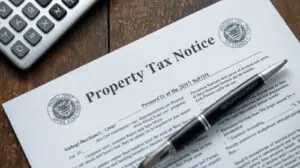Owning vacant land you don’t use can become a financial burden. Property taxes continue year after year, draining your bank account for property that provides no income or benefit. If you’re wondering how to stop paying property taxes on vacant land I don’t use, you have several legal options to consider.
Property taxes fund local services like schools, roads, and emergency services. However, when you own land that sits unused, these ongoing costs can feel overwhelming. The good news is that you don’t have to pay property taxes forever on land you’ll never develop or use.
Legal Ways to Stop Paying Property Taxes on Vacant Land
The most effective strategies involve transferring ownership or changing how the property is classified. Each approach has different requirements and consequences, so it’s important to understand your options before making a decision.
Sell Your Vacant Land
The most straightforward way to stop paying property taxes is to sell your vacant land. Once you transfer ownership, the tax responsibility moves to the new buyer. This approach provides immediate relief from ongoing tax obligations.

Before selling, research your land’s current market value. Check price per acre by zip code to understand local market conditions. Consider getting a professional appraisal for larger parcels or properties in developing areas.
Selling to a land buying company offers speed and convenience. These companies purchase properties as-is, eliminating the need for surveys, environmental studies, or property improvements. The transaction typically closes within 30 days, providing quick relief from tax obligations.
Donate the Property to Charity
Charitable donations represent another effective strategy. When you donate vacant land to a qualifying nonprofit organization, you eliminate future property tax payments while potentially receiving a tax deduction.

The charity must accept the donation and use the property for exempt purposes. Land conservancies, religious organizations, and educational institutions often accept land donations. However, the charity may decline if the property has environmental issues or significant ongoing costs.
Consult with a tax professional before donating property. The IRS requires proper documentation and appraisals for donations exceeding $5,000 in value. You may need to pay for environmental assessments or surveys as part of the donation process.
Understanding Property Tax Exemptions
Some properties qualify for tax exemptions that reduce or eliminate property taxes. These exemptions vary by state and local jurisdiction, but several common categories exist.

Agricultural Exemptions
Many states offer reduced property taxes for land used in agricultural production. If your vacant land meets minimum acreage requirements and generates agricultural income, you might qualify for significant tax reductions.
Agricultural use typically requires active farming, livestock grazing, or timber production. Some states accept minimal agricultural activity, such as hay production or cattle leasing. Contact your local tax assessor to learn about specific requirements in your area.
Conservation Easements
Conservation easements allow you to retain ownership while restricting development rights. In exchange for limiting future development, you may receive property tax reductions and federal tax benefits.

Land trusts and conservation organizations work with property owners to establish easements. The process involves legal documentation and ongoing monitoring to ensure compliance with conservation restrictions. While you maintain ownership, the development restrictions permanently reduce the property’s assessed value.
Strategic Considerations Before Taking Action
Before deciding how to stop paying property taxes on vacant land you don’t use, evaluate the long-term implications. Consider future development potential, family needs, and market trends in your area.
Assess Market Trends
Research local real estate market conditions to understand if your property value might increase significantly. Rapid development or infrastructure improvements could make holding the property worthwhile despite ongoing taxes.
However, if the area remains stagnant or declining, continuing to pay property taxes may not make financial sense. Calculate total holding costs including taxes, insurance, and maintenance over several years to determine if selling makes more sense.
Consider Family Needs
Think about whether family members might want to use the property in the future. Children or grandchildren might eventually build homes or start businesses on the land. Discuss your plans with family members before making irreversible decisions.
If family members express interest but cannot currently take ownership, explore options like gifting or selling the property to them at below-market rates. This approach keeps the land in the family while transferring tax obligations.
Alternative Strategies for Reducing Tax Burden
If you’re not ready to sell or donate your vacant land, consider strategies that reduce your property tax burden without eliminating ownership.
Appeal Your Assessment
Property tax assessments sometimes exceed actual market value. Review your assessment notice and compare it to recent sales of similar properties. If your land appears overvalued, file an assessment appeal with your local tax authority.

Successful appeals can reduce your assessed value and lower annual tax payments. Gather comparable sales data and consider hiring an appraiser if seeking significant reductions. The appeal process varies by jurisdiction but typically involves submitting documentation and attending a hearing.
Explore Payment Plans
Some tax authorities offer payment plans or deferrals for property owners experiencing financial hardship. While this doesn’t eliminate taxes, it can provide temporary relief and prevent penalties or foreclosure.
Senior citizens and disabled property owners may qualify for specific tax relief programs. Contact your local tax collector to learn about available programs and eligibility requirements.
Professional Guidance and Next Steps
Navigating property tax issues requires careful consideration of legal and financial implications. Consult with tax professionals, real estate attorneys, and financial advisors before making major decisions about your vacant land.
Each strategy has different timeframes and requirements. Selling provides immediate relief but eliminates future opportunities. Donations offer tax benefits but require qualifying charities. Exemptions reduce costs but may involve ongoing obligations.
Document all decisions and maintain records of property taxes paid, improvements made, and professional consultations. These records support future tax filings and provide evidence of your property management efforts.

Understanding how to stop paying property taxes on vacant land you don’t use empowers you to make informed decisions about your property. Whether you choose to sell, donate, or explore exemptions, taking action eliminates the ongoing financial burden of unused land. Sell my land options provide the quickest path to freedom from property tax obligations.
Want to sell your land fast? Contact She Buys Land today.